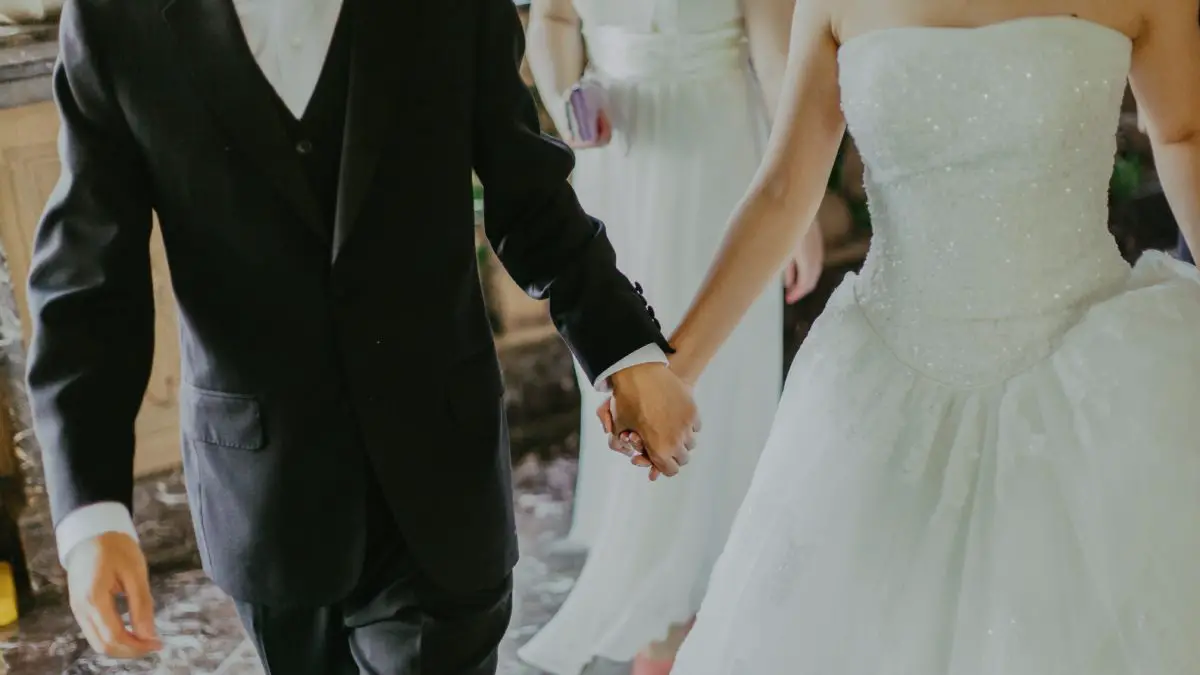There’s a saying that “love and marriage go together like a horse and carriage”. But perhaps the saying should be that English and idioms go together like love and marriage – and we have plenty of marriage idioms about weddings and matrimony to prove it!
In this list, you’ll find phrases to discuss weddings, describe your partner, and even ask someone to marry you.

Marriage idioms
We’ll begin with some marriage idioms which describe being married or being in a relationship in general. Further down, you’ll see some phrases to discuss weddings and getting married.
Other half / Better half
A marriage is a union between two people, so two halves make a full marriage. You can, therefore, describe your spouse or partner as your other half.
You could also call them your better half, in which case you are paying them a compliment and saying they are the better person in the relationship.
“My better half is working at the moment but I’ll ask her when she gets back.”
“Guys, this is Jocelyn, my other half.”
Head over heels
This is a love-related idiom that describes being deeply and madly in love. If you’re getting married then hopefully you feel this way about the other person.
“Becky, I feel head over heels in love the very first moment I saw you.”
Another context you may hear this in, not related to wedding idioms, is when someone physically falls. If you have a bad fall, someone may say you feel head over heels down the stairs, for example.
Mail-order bride
Weddings, for the most part, are happy, loving occasions. This marriage idiom, on the other hand, is an unkind way to describe the bride and the relationship.
A mail-order bride is a woman who meets her (normally foreign) future husband via written communication, usually online. Then, after a long-distance courtship, a contractual agreement is drawn up for them to meet and get married.
“To be honest, from the way she dresses to the way she sounds, I think she’s a mail-order bride.”
There are actually some dating sites that are set up for this purpose, but it may still be considered rude to describe someone as a mail-order bride. You are suggesting that the relationship is transactional more than loving.
May-December
When one person is a lot older than the other, we can describe it as a May-December relationship or romance.
“I think there’s a 12-year age gap so it’s a bit of a May-December romance.”
We do also have the words ‘cougar’ (for an older lady with a younger man) or ‘sugar daddy’ (for an older man with a younger wife). However, many people would find these terms offensive so be careful how you use them.
Apple of my eye
When you describe someone as the apple of your eye, it means that you are extremely fond and proud of them.
“Darren, my dearest love, you are the apple of my eye and I can’t wait to be married to you for the rest of my life.”
This phrase is not just about marriage; a parent could also say this to their child – but there are many more idioms for children as well.
Ball and chain
There are many marriage idioms to describe your wife, and most of them are worryingly negative!
A ball and chain is something heavy that was supposed to be tied to a prisoner’s ankle to stop them from running away. So, this expression is an old-fashioned way to describe a wife if she restricts the husband’s freedom and he can’t do all the things he would like.
“The old ball and chain said I can’t join our annual lad’s snowboarding trip.”
Discover more idioms about freedom – including some that relate to family and relationships.
Those three little words
You’ll often see or hear the expression those three little words in movies or on social media. Traditionally this refers to the saying “I love you”.
“I’ve been waiting for you to say those three little words since we started dating.”
However, you may also see this referring to three different words, usually as a joke.
“What three little words do all women want to hear? ‘You were right’.”
“I love it when my wife says those three little words to me: ‘I cooked dinner’.”
Trophy wife
If a man marries a lady who is younger than him and very beautiful, people may call her a trophy wife.
“Well look at those two! She’s such a trophy wife.”
People may think these relationships are not built on love but on status and power, and that the man needs to keep spending money on his wife in order for her to stay loyal to him. It’s surprising how many beautiful idioms actually have negative connotations.
Trouble and strife
This phrase is more British English as it uses cockney rhyming slang. Due to the fact that trouble and strife rhymes with ‘wife’, that is who this phrase is about.
It may sound like a negative way to describe someone, but it’s most often used in an affectionate way.
“Sorry lads, my trouble and strife says I can’t go out for a drink tonight!”
Cockney rhyming slang is a very British thing and a lot of fun. It originated in the East End of London but is now used throughout the UK.
Wear the trousers / pants
British English would say trousers. American English would say pants. No matter which you choose, the person that wears the pants or trousers is the person who is said to control the relationship or make most of the decisions.
“It’s obvious who wears the trousers in that relationship.”
Check out some more American vs British idioms and slang here.
In-laws
When you marry someone, you become a part of their family. Your spouse’s family members can be described as your in-laws, since they are related to you through the lawful act of marriage.
You can talk about your mother-in-law, brother-in-law, daughter-in-law, etc. or refer to them more generally as your in-laws.
“We’re going to visit the in-laws this weekend.”
“At least half of our arguments occur because of my in-laws.”
There are lots more idioms about family that might come in handy after you get married.

Idioms for getting married or engaged
We have a surprising number of ways to say ‘get married’ or ‘get engaged’ in English. Take a look at these…
Get down on one knee
Before you get married, you need to get engaged, which means asking the person to marry you. This action is called a proposal.
The traditional way of doing this is for one person (usually the man) to bend one knee to the ground in front of the other person, produce an engagement ring, and ask ‘Will you marry me?’. When you kneel in front of someone you, get down on one knee, so this term is a simple description of the act of proposing.
“If he doesn’t get down on one knee soon I think I’m going to leave.”
The tradition in many counties (like the UK) is that on February the 29th, during a leap year, women are allowed to break the tradition of the man proposing and do it themselves instead.
Pop the question
The phrase pop the question is an informal way to describe the act of proposing to someone.
“I can’t believe I’m going to pop the question tomorrow. I’m so nervous.”
Hand in marriage
Asking for someone’s hand in marriage is one of the more old-fashioned wedding idioms and phrases you’ll come across. Tradition dictates that a man should ask permission from his bride-to-be’s father (or perhaps parents nowadays) before proposing to her.
“Mr Potter, I would like to ask for your daughter’s hand in marriage.”
Although it may sound a little outdated, this could also be used in a proposal or wedding speech.
Get hitched
On a list of marriage idioms, the informal phrase get hitched has to be included. It’s just a more casual way of saying ‘get married’.
“So, when are you two getting hitched?”
Put a ring on it
Have you heard the popular song by Beyonce called Single Ladies? In it are the lyrics If you liked it, you should have put a ring on it. She’s basically saying: if you liked me you should have asked to marry me.
In this marriage idiom, ‘it’ refers to your finger. You could be talking about an engagement ring or a wedding ring, but the idiom usually applies to a couple who are not yet engaged.
“If you want to stay together, you’d better put a ring on it!”
Tie the knot
Tie the knot is just another fun idiom to describe getting married. This one originates from the Celtic practice of handfasting.
“I think it’s about time you two tied the knot.”
Jump the broom
Although used worldwide, the term to jump the broom is a more American English idiom for getting married, usually without a religious ceremony.
“Well, I think it’s time to make this official and jump the broom.”
This idiom has a very strong connection with black history that is worth being aware of.
Take the plunge
Although we have listed this here with marriage idioms, this phrase could be used in a number of different situations. To take the plunge is to promise to take action that you may feel nervous about. This could be making an investment, marrying someone, or even starting a new hobby.
“Right, I think it’s time I take the plunge! I’m going to ask her to marry me.”
Wedding idioms
Finally, these idioms relate specifically to weddings.
A shotgun wedding
Not the most romantic of marriage idioms, but it’s still a good one to know. If you wish to gossip about the fact that someone had a particularly rushed wedding, perhaps under suspicious circumstances, you could describe it as a shotgun wedding.
“I didn’t even know they were engaged. It seems like a bit of a shotgun wedding if you ask me.”
Sometimes these weddings happen when the bride is pregnant and would prefer to have the wedding before everybody knows about the pregnancy. Another British term for this situation is a knobstick wedding.
White wedding
The phrase white wedding describes a very traditional wedding, usually held in a church, with the bride wearing a big white dress.
“I can’t be bothered with all the fuss of a white wedding. We’re going for something much more low-key.”
It’s true that planning a big wedding can be very stressful. These stress idioms might help you describe how you are feeling if you are in this situation.
Gretna Green
This is a more British idiom or term, since Gretna Green is a location in Scotland, right on the border with England. It used to be an infamous location for couples to elope because of Scotland’s comparatively relaxed marriage laws. To elope is to run away and get married without telling anyone.
“I’m really not enjoying planning for this wedding. Sometimes I just feel like running away to Gretna Green!’
Before you pack your bags and head for Scotland, be aware that things have changed and it’s not as easy as it once was to get married there.
Cold feet
Lots of these wedding idioms and phrases can be used in other situations. To get cold feet is to lose your nerve, be apprehensive or start to doubt your choice. When talking about a wedding, it would mean that one person is having doubts about getting married.
“Just because you have cold feet, doesn’t mean we’re going to cancel the wedding.”
Check out some more cold idioms here.
Call it off
Having cold feet might mean you decide to cancel your wedding completely, or call it off. Again, this idiom could apply in a wide range of situations, including weddings.
“I found out he was cheating on me! We’re going to have to call it off.”
“It looks like it’s going to rain tomorrow. We’d better call off the garden party we had planned.”
Icing on the cake
There are a number of things that spring to mind when you think about weddings. The dress, the honeymoon, and perhaps the wedding cake.
A plain cake isn’t that exciting, but it’s the icing on the cake that makes it really special – especially a beautifully decorated wedding cake. We use this expression to describe something that makes a thing or situation even better.
“I love the job but the fact I get a company car is just the icing on the cake.”
This is just one of many food idioms we have in English.
You can’t dance at two weddings at once
This final wedding saying is actually a Yiddish proverb. Saying you can’t dance at two weddings at once means you can’t be in two places or focus on two things at the same time.
“Decide which job you want and stick with it. You can’t dance at two weddings at once.”
You now have an impressive number of ways to describe weddings, talk about getting married, and express feelings for your spouse (we hope you choose the kind ones).
Which of these marriage idioms will be most helpful for you? Let us know in the comments, or share any others you can think of. Next, why not check out some heart idioms? But be warned – they are not all about love and happiness!



